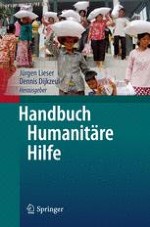2013 | OriginalPaper | Chapter
6. Alte und neue staatliche Geber: Auf dem Weg zu einem universellen humanitären System?
Authors : Andrea Binder, Alexander Gaus, Claudia Meier
Published in: Handbuch Humanitäre Hilfe
Publisher: Springer Berlin Heidelberg
Activate our intelligent search to find suitable subject content or patents.
Select sections of text to find matching patents with Artificial Intelligence. powered by
Select sections of text to find additional relevant content using AI-assisted search. powered by
